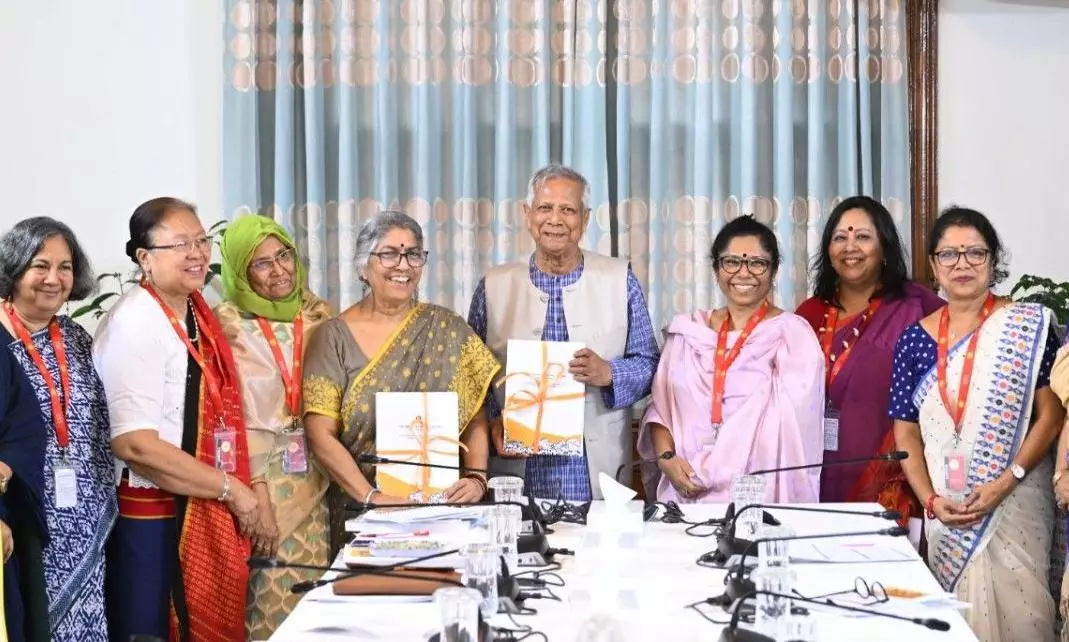
Why Islamist groups are spewing rage on Yunus over women's panel report
Report moots uniform family code for gender parity in inheritance, marriage, divorce and political representation; Islamists see it as 'threat to social fabric'

Bangladesh's interim government, under the leadership of Chief Adviser Muhammad Yunus, has run into big trouble with hardline Islamist groups. These groups, who had strongly supported him earlier, are now opposing a report by the Women's Commission, set up by the Nobel laureate.
The report has recommended a uniform family code to ensure equality of men and women in matters of inheritance, marriage, divorce and political representation, which Islamist groups see as a “threat to the country’s social fabric”.
Nobel laureate Yunus has upset the Islamists by posting a few key recommendations of the Commission on social media, which they see as “his endorsement of the report based on Western ideas".
Islamist groups resurface
Bangladesh is a Muslim-majority nation but its struggle for independence from Islamist Pakistan in 1971 was driven by secular, linguistic Bengali nationalism. That was subsequently compromised by military dictators Generals Ziaur Rahman and HM Ershad, the latter declaring Islam as state religion.
Radical Islamist groups, driven to a corner by the iron-fisted rule of ousted ruler Sheikh Hasina, daughter of Bangladesh's founder Sheikh Mujibur Rahman, have resurfaced with a vengeance since August last year after Hasina fled the country during a mass agitation.
Also read: In Bangladesh, Islamists have unleashed a Yunus model of mobocracy
The Yunus administration has indulged the Islamist hardliners so far to keep in check established political parties that want immediate elections. The Islamists have attacked women who play football, refuse to don the hijab and burqa or indulge in other practices considered un-Islamic.
Political representation
Now these groups have joined hands to pressure Yunus to trash the Women's Commission report, especially the recommendation to expand women's representation in Parliament by creating 300 reserved seats. Now there are 50 such reserved seats besides 300 regular seats.
"The idea is to create equal representation for women who are more than half the country's population," said a Women's Commission member.
Yunus won the Nobel for pioneering microcredit in Bangladesh, driven by a desire to create gender equality as a tool of social change. But hardline Islamists often deride Yunus as “the moneylender” and oppose the practice of charging interest on microcredit loans as un-Islamic.
Now they are up in arms with the Women's Commission report, even accusing it of being capable of 'unsettling traditional social norms'.
A Western ideology
Hefazat-e-Islam, a powerful platform of Qaumi Madrassas or seminaries promoting religious education, has demanded the cancellation of the Women's Affairs Reforms Commission set up by the interim government.
Azizul Haque Islamabadi, a senior Hefazat-e-Islam leader, was quoted by AFP as saying the group opposes the commission's recommendation for ending discriminatory provisions against women.
Also read: Is Islamists’ attack on women’s football a step towards Bangladesh’s talibanisation?
"Ensuring gender equality is a Western ideology, not compatible in a Muslim nation as ours," Islamabadi said, adding that the commission has recommended a uniform family code instead of Muslim family law, which governs inheritance, marriage, divorce, and other issues and "that is simply not acceptable".
Jamaat-E-Islami, the largest Islamist political party, also demanded the immediate cancellation of the recommendations.
Distorting Islamic ideology
"Recommending initiatives to ensure equality between men and women is a malicious effort to distort Islamic ideology," Mia Golam Parwar, secretary general of Jamaat, said in a statement. The Jamaat supported the Pakistan army during the 1971 Liberation War and continues to advocate the creation of an Islamist state governed by Sharia laws.
Hasina had banned the Jamaat on the grounds that its party manifesto was not compatible with the spirit of Bangladesh's Constitution. But Yunus nullified the ban and restored Jamaat's political registration after taking charge.
Now it seems the likes of Jamaat and Hefazat are falling out with Yunus, who seems to be endorsing the commission's recommendations. His first reaction to the report was "women all over the world are looking at us".
But the Islamist groups think Yunus is “trying to play to the gallery in an effort to placate the West."
Upholding women's rights
Shirin Parvin Haque, the head of the commission, said they were determined to press ahead.
"We have proposed recommendations we believe are best for upholding women's rights, we will stick to that," she said, even as Islamist bloggers attacked her as “unrepentant Islamophobe”. Haque reacted by saying: "Let them speak their mind".
Gender activists have strongly backed Haque's report as “nothing short of revolutionary".
"Women's empowerment has a long history in Bengali society and that cannot be undone by religious fanatics," said Tania Amir, a top lawyer.
Legitimacy for sex work
One of the significant recommendations of the Women's Commission is to recognise sex work as a legitimate profession and extend all possible protection to them. The Islamist groups decry this as an attempt to “legitimise immorality,” but sex workers welcomed the recommendation.
"We are just another group of service providers. We have existed in all societies down the ages but we are badly exploited because the work is illegal. That must change," said Nasima Rahmatullah, a middle-aged sex worker in Daulatdia, Bangladesh's biggest red-light district.
Bangladesh's two major political parties, Awami League and Bangladesh Nationalist Party, are yet to formally react stating that they are studying the voluminous report and will take a stand after detailed discussions within the party.

